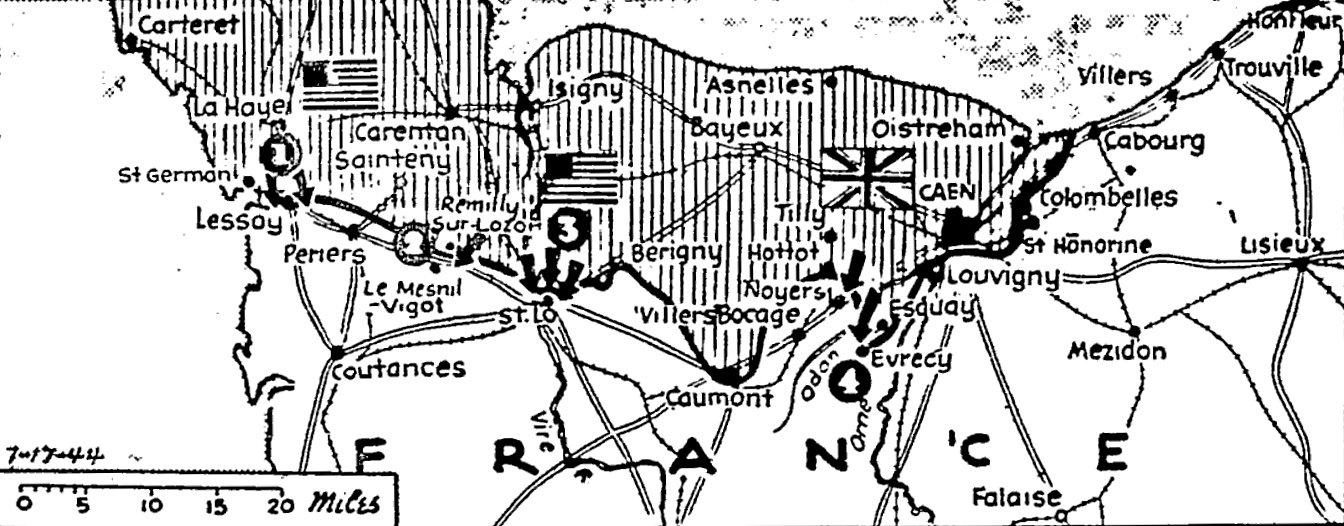The Pittsburgh Press (July 17, 1944)
YANKS SMASH INTO SAINT-LÔ
Bradley’s men close arc on Nazi keystone
Americans also cut Périers–Saint-Lô road
By Virgil Pinkley, United Press staff writer
Drive of U.S. patrol into Saint-Lô highlighted news from Normandy today. Other U.S. forces stormed approaches to Lessay (1). The Yanks cut the Périers–Saint-Lô highway by driving into the village of Les Mesnil-Vigot (2). The Nazis were expected to make a street-to-street fight in Saint-Lô (3). In the Caen area, the British drove into Noyers and Évrecy after gains of nearly three miles (4).
SHAEF, London, England –
U.S. patrols smashed into Saint-Lô today, bringing the central keystone of the German line in Normandy almost within the Allied grasp, and other U.S. assault forces stormed the near approaches of Périers and Lessay.
British forces waging a new offensive below Caen battered forward several hundred yards after gains of two-and-a-half miles yesterday in extremely heavy fighting and drove into the key villages of Noyers and Évrecy, wresting parts of each from the German defenders.
Clamp siege arc
Lt. Gen. Omar N. Bradley’s U.S. 1st Army clamped a siege arc tightly against Saint-Lô, its prongs probing the near German fortifications southeast and northwest of the town, while advanced elements broke the Nazi crust to penetrate the rubble-strewn streets.
Other U.S. forces closing against the two remaining anchor bases of the German defenses facing the American front, captured a village a mile northwest of Périers, and seized a flooded area of Lessay to bring that town under direct attack from three sides.
Five miles southwest of Périers, the Americans cut the arterial highway to Saint-Lô, the backbone of the entire German defense line fronting the Americans, by a drive to the village of Le Mesnil-Vigot.
Bayonets and grenades
The assault which laid open the fortifications in the outskirts of Saint-Lô was launched at 4:30 a.m. (local time) today. The doughboys clambered out of their foxholes and hedgerows with bayonets flashing and grenades flying.
Taken by surprise because of the absence of artillery preparation, the Germans reeled back, and the American assault rolled fast in its early stages, United Press writer James McGlincy reported from the front.
This dispatch sent at 2:50 p.m. said they had reached the outskirts of Saint-Lô in a push down the highway from the northeast, where they struck into the “City of the Future,” a modern housing project.
Sun breaks through
Thick mist prevented artillery observation and air support until 10:00 a.m. Then the sun broke through, and Thunderbolts swarmed in to lay a shower of bombs on the German positions, which were also rocked by round after round of artillery fire.
Saint-Lô, where Charlemagne once had fortifications and which German troops made into a sort of Cassino of the Western Front, was hugged in a strangling grip when the first foot patrols pushed across the city limits.
German paratroopers, the cream of the enemy infantry, were fighting with extreme tenacity for high ground northwest of Saint-Lô and to the south of the town. But U.S. patrols had been infiltrating well to the south of the town for some time.
High optimism reflected
High optimism was reflected in the official statement that until the remaining high ground around Saint-Lô is in American hands, the occupation of the town cannot be called complete.
Because of the importance the Germans attach to Saint-Lô, guardian of the road running southwest, they were expected to fight for it, street by street.
Some of the heaviest fighting on the British front since D-Day was reported in and around Noyers and Évrecy, four miles apart on opposite sides of the Odon River below Caen.
The British were punching southward in two parallel thrusts, holding some houses in the eastern part of Évrecy and at least the eastern portion of Noyers.
After capturing Hill 113, the British worked southeast across the Évrecy–Caen highway and had reached a point 500 yards southeast of the highway.
Fierce artillery barrage
United Press writer Richard D. McMillan reported from advanced British headquarters near Caen that big guns pounded the German positions between the Odon and Orne all night, converting them into what a staff officer described as “hell on earth.”
Mr. McMillan said the gun backing up the new push were of the “largest caliber” and arrived with heavy reinforcements from Britain in Gen. Sir Bernard L. Montgomery’s systematic buildup of strength.
Mr. McMillan said:
We continued to make local gains elbowing the enemy out from clumps of woods, slowly but surely pushing our way toward the Caen plain from which we will find room and suitable terrain to carry out an armored battle.
Every house a pillbox
Every house in every village around Lessay has been converted into a pillbox manned by paratroops and picked units of Germany’s crack SS troops, United Press writer Henry T. Gorrell reported.
The Germans were using their “doodlebugs,” miniature remote-control tanks loaded with explosives, against the Americans in the Lessay sector, but with no more success than they enjoyed in Italy, Mr. Gorrell said.
The Americans also seized high ground east of Périers, third anchor of the German line in the American sector.

